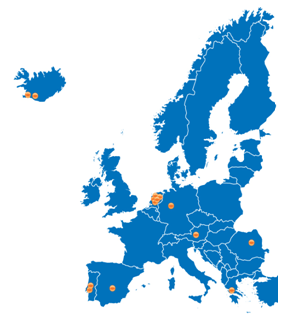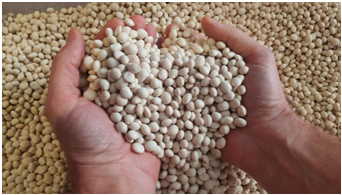 LIBBIO (Lupin Bioeconomy Development) is a four years R&D project for increasing biomass production and strengthening European bio-economy. It is supported by the Bio Based Industries Joint Undertaking-BBI JU, a cooperation between Bio-based Industry Consortium and the European Commission. The project group consists of fourteen partners from eight countries.
LIBBIO (Lupin Bioeconomy Development) is a four years R&D project for increasing biomass production and strengthening European bio-economy. It is supported by the Bio Based Industries Joint Undertaking-BBI JU, a cooperation between Bio-based Industry Consortium and the European Commission. The project group consists of fourteen partners from eight countries.
 We Europeans are in some sense doing properly in developing our bio-economy, on the other hand we haven’t been able to increase our own production of bio-materials as needed. For example we are importing a lot of palm oil from South Asia and soy protein from South America where rain forest has been cut for serving our demands. This is not mainly an economic issue, this is rather an ethical issue.
We Europeans are in some sense doing properly in developing our bio-economy, on the other hand we haven’t been able to increase our own production of bio-materials as needed. For example we are importing a lot of palm oil from South Asia and soy protein from South America where rain forest has been cut for serving our demands. This is not mainly an economic issue, this is rather an ethical issue.
So how do we Europeans get self-sufficient with protein, bio-based oil and other bio-based material for an increasing non-food application without compromising food production? LIBBIO´s suggested solution is to make use of marginal lands, land which is not fertile enough to be economically utilised. We have huge areas in Europe which are currently not in use for different reasons, such as that it requires too much fertiliser to get acceptable yield, affecting the economy (and sustainability).
The LIBBIO project concept is to grow lupin, a plant which grows quite well in marginal soil. Lupin farming requires less fertilizing than other biomass (due to bacteria enhanced nitrogen fixation from air). Lupins have also the ability to mobilise phosphates in soils and make these bioavailable for other crops, thereby reducing need for intensive phosphate fertilisation. Growing lupin does not normally reduce soil nutrition value as most arable crops with decreased yield by time, it improves the soil and yield is normally increased by time.
 The LIBBIO consortium is counting on Lupin from the Andes (Lupinus mutabilis), it is a large crop which gives more yield than native European lupins. The seeds contain more protein than currently grown crops in Europe, over 40% and it contains nearly 20% oil. These are valuable fractions.
The LIBBIO consortium is counting on Lupin from the Andes (Lupinus mutabilis), it is a large crop which gives more yield than native European lupins. The seeds contain more protein than currently grown crops in Europe, over 40% and it contains nearly 20% oil. These are valuable fractions.
The LIBBIO project includes breeding of the crop for South European and North European conditions and modern harvesting technology. It also includes cropping protocol optimisation, biorefinery processing, application assessment of fractions and finally techno-economic and sustainability assessment.
After one year of work with field trials in seven countries, preliminary process and application studies, the partners have become more and more optimistic on the project concept. The first fraction isolated is oil, an early prototype of cosmetic products (lipsticks and hand cream) containing this oil has been developed. The LIBBIO oil seems to be excellent for these applications with many promises for more.
Further information on cropping, supercritical biorefinery and food and cosmetics product development will be provided here on BE-Sustainable as the project progresses.
This project has received funding from the Bio Based Industries Joint Undertaking under the European Union’s Horizon 2020 research and innovation programme under grant agreement No 720726.


